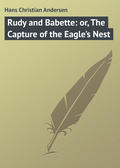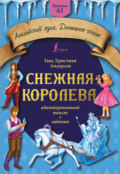
Ганс Христиан Андерсен
O. T., A Danish Romance
“O, she is only quarrelsome!” said the girl, to whom Otto had turned for an explanation. “Aunt is angry because she was not invited to sail with the company. She always does so,—she can be quite wicked! Just lately, when she should have helped me to wring out the sheets, she always twisted them the same way that I did, so that we could never get done, and my hands hurt me very much!”
Otto walked down to the bay. The sail was unfurled, the secretary brought out his musical-box, and, accompanied by its tones, they glided in the burning sunshine over the water.
On the other side tea was to be drunk, and then Maren was to sing. Her mother asked her to sing the song with the strong tones, so that Otto might hear what a voice she had.
She sang “Dannevang.” Her voice had uncommon power, but no style, no grace.
“Such a voice, I fancy, you have not heard in the theatre at Copenhagen?” said the secretary, with dogmatical gravity.
“You might wish yourself such a chest!” said the lieutenant.
The secretary should now sing; but he had a little cold, which he had always.
“You must sing to the musical-box!” said the lady, and her wish was fulfilled. If Maren had only commenced, one might have believed it a trial of skill between Boreas and Zephyr.
They now walked about, drank tea, and after this they were to return to the house, there to partake of fish and roast meat, a piece of boxed ham, and other good things.
Otto could by no means be permitted to think of leaving them the following morning; he must remain a few days, and gather strength, so that in Copenhagen he might apply himself well to work. But only one day would he enjoy all the good things which they heaped upon him. He yearned for other people, for a more intellectual circle. Two years before he had agreed splendidly with them all, had found them interesting and intellectual; now he felt that Lemvig was a little town, and that the people were good, excellent people.
The following play again brought capital cookery, good foul, and good wine—that was to honor Mr. Thostrup. His health was drunk, Maren was more confidential, the aunt had forgotten her trouble, and again sat with a laughing face beside the constrained shopman. They must, it is true, make a little haste over their dinner, for the fire-engine was to be tried; and this splendor, they maintained, Otto must see, since he so fortunately chanced to lie there.
“How can my mother think that this will give Mr. Thostrup pleasure?” said Maren. “There is nothing to see in it.”
“That has given him pleasure formerly!” answered the mother. “It is, also, laughable when the boys run underneath the engine-rain, and the stream comes just in their necks.”
She spoke of the former Otto and of the present one—he was become so Copenhagenish, so refined and nice, as well in the cut of his clothes as in his manners; yet she still found an opportunity of giving him a little hint to further refinement. Only think! he took the sugar for his coffee with his fingers!
“But where are the sugar-tongs, the massive silver sugar-tongs?” asked she. “Maren, dost thou allow him to take the sugar with his fingers?”
“That is more convenient!” answered Otto. “I do that always.”
“Yes, but if strangers had been here,” said the hostess, in a friendly but teaching tone, “we must, like that grand lady you know of, have thrown the sugar out of the window.”
“In the higher circles, where people have clean fingers, they make use of them!” said Otto. “There would be no end of it if one were to take it with the sugar-tongs.”
“They are of massive silver!” said the lady, and weighed them in her hand.
Toward evening Rosalie went into the garden under the plum trees.
“These, also, remind me of my mountains,” said she; “this is the only fruit which will properly flourish there. Lemvig lies, like La Locle, in a valley,” and she pointed, smiling, to the surrounding sand-hills. “How entirely different it is here from what it is at home on thy grandfather’s estate! There I have been so accustomed to solitude, that it is almost too lively for me here. One diversion follows another.”
It was precisely this which Otto did not like. These amusements of the small towns wearied him, and he could not delight himself with them, no longer mingle in this life.
He wished to set out early the following morning. It would be too exhausting to drive along the dry road in the sun’s heat, they all declared; he must wait until the afternoon, then it would be cooler; it was, also, far pleasanter to travel in the night. Rosalie’s prayers decided him. Thus, after dinner and coffee, the horses should be put into the carriage.
It was the last day. Maren was somewhat in a grave mood. Otto must write in her album. “He would never come to Lemvig again,” said she. As children they had played with each other. Since he went to Copenhagen she had, many an evening, seated herself in the swing near the summer-house and thought of him. Who knows whether she must not have done so when she copied out of the secretary’s memorandum-book, the verses,—
“So fliessen nun zwei Wasser
Wohl zwischen mir and Dir?”
The sea certainly flows between Aarhuus and Copenhagen.
“Maren will perhaps go over for the winter,” said the mother; “but we dare not speak too much about it, for it is not yet quite settled. It will really make her gayer! lately she has been very much inclined to melancholy, although God knows that we have denied her no pleasure!”
There now arrived a quantity of letters from different acquaintance, and from their acquaintance: if Mr. Thostrup would have the goodness to take care of this to Viborg, these to Aarhuus, and the others as far as Copenhagen. It was a complete freight, such as one gets in little towns, just as though no post went through the country.
The carriage stopped before the door.
Rosalie melted into tears. “Write to me!” said she. “Thee I shall never see again! Greet my Switzerland when thou comest there!”
The others were merry. The lady sang,—
“O could I, like a cloud, but fly!”
The young lady from Holstebro bowed herself before him with an Album-leaf its her hand, upon which she must beg Mr. Thostrup to write her something. Maren gave him her hand, blushed and drew back: but as the carriage rolled away she waved her while handkerchief through the open window: “Farewell! Farewell!”
CHAPTER XX
“Stop! cried Patroclus, with mighty, thundering voice.”
—WILSTER’S Iliad.
The parting with Rosalie, the hospitality of the family, and their sincere sympathy, touched Otto; he thought upon the last days, upon his whole sojourn in his home. The death of his grandfather made this an important era in his life. The quiet evening and the solitary road inclined him still more to meditation.
How cheering and interesting had been a visit to Lemvig in former times! Then it furnished matter for conversation with Rosalie for many weeks; it now lay before him a subject of indifference. The people were certainly the same, therefore the change must have taken place in himself. He thought of Copenhagen, which stood so high, and of the people there.
“After all, the difference is not so great!” said he. “In Copenhagen the social foci are more numerous, the interests more varied; each day brings a fresh topic of conversation, and one can choose one’s society. The multitude, on the contrary, has something citizenish; it obtrudes itself even from beneath the ball-dress which shows itself at court; it is seen in the rich saloon of the wholesale merchant, as well as in the house of the brandy distiller, whose possessions give to him and his two brewers the right of election. It is the same food which is presented to us; in the small towns one has it on earthenware, in Copenhagen on china. If one had only the courage, in the so-called higher classes, to break through the gloss which life in a greater circle, which participation in the customs of the world, has called forth, one should soon find in many a lady of rank, in many a nobleman who sits not alone in the theatre, on the first bench, merely that empty common earthenware; and that, as with the merchant’s wife in Lemvig, a déjeuner or a soirée, like some public event, will occupy the mind before and after its occurrence. A court-ball, at which either the son or daughter has figured, resembles the most brilliant success in an examination for office. We laugh at the authorities of Lemvig, and yet with us the crowd runs after nothing but authorities and newspapers. This is a certain state of innocence. How many a poor officer or student must play the subordinate part of the shopman at the table of the rich, and gratefully kiss the hand of the lady of the house because she has the right of demanding gratitude? And in the theatre, with the multitude, what does not ‘an astonishing chest’ do? A strength of voice which can penetrate right through the leather of the mind gains stormy applause, whilst taste and execution can only be appreciated by the few. The actor can be certain of applause if he only thunder forth his parting reply. The comedian is sure of a shout of bravo if he puts forth an insipidity, and rubs his legs together as if replying with spirit and humor. The massive plate in the house gives many a lady the boldness to teach that in which she herself might perhaps have been instructed. Many a lady, like the Mamsell from Holstebro, dresses always in silk and a long shawl, and if one asks after her profession one finds it consists at most in dress-making; perhaps she does not even possess the little accompanying talent of playing the flute. How many people do not copy, like Maren, out of other people’s memorandum-books, and do not excel musical-boxes! still one hears a deal of musical snuff-box music, and is waited upon by voices which are equally as insignificant as the secretary’s.”
These were pretty much Otto’s reflections, and certainly it was a good feeling which lay at the bottom of them. Let us remember in our judgment that he was so young, and that he had only known Copenhagen one year; otherwise he would most certainly have thought quite differently.
Night spread itself over the heath, the heavens were clear. Slowly the carriage wound along through the deep sand. The monotonous sound, the unchanging motion, all rendered Otto sleepy. A falling star shot like a fire column across the sky—this woke him for a moment; he soon again bowed his head and slept, fast and deep. It was an hour past midnight, when he was awoke by a loud cry. He started up—the fire burnt before them; and between it and the horse stood two figures, who had taken hold of the leather reins. Close beside them was a cart, under which was placed a sort of bed, on which slept a woman and some children.
“Will you drive into the soup-kettle?” asked a rough voice, whilst another scolded in a gibberish which was unintelligible to Otto.
It had happened to the coachman as to him, only that the coachman had fallen asleep somewhat later; the horses had lost their track, and uncertain, as they had long been, they were now traversing the impassable heath. A troop of the so-called Scavengers, who wander through these districts a nomadic race, had here taken up their quarters for the night, had made a fire and hung the kettle over it, to cook some pieces of a lamb they had stolen on their journey.
“They were about half a mile from the highway,” said an elderly woman who was laying some bushes of heath under the kettle.
“Half a mile?” replied a voice from the other side of the cart, and Otto remarked a man who, wrapped in a large gray riding-cloak, had stretched himself out among the heather. “It is not a quarter of a mile to the highway if people know how to direct their course properly!”
The pronunciation of the man was somewhat foreign, but pure, and free from the gibberish which the others employed in their speech. The voice seemed familiar to Otto, his ear weighed each syllable, and his blood ran quicker through his veins: “It is the German Heinrich, the evil angel of my life!” he felt, and wrapt himself closer in his mantle, so that his countenance was concealed.
A half-grown lad came forward and offered himself as a guide.
“But the lad must have two marks!” said the woman.
Otto nodded assent, and glanced once more toward the man in whom he believed he recognized the German Heinrich; the man had again carelessly stretched himself among the heath, and did not seem inclined to enter into farther discourse.
The woman desired the payment in advance, and received it. The boy led the horses toward one side; at the moment the fire flare up between the turf-sods, a great dog, with a loose cord about his neck, sprang forward and ran barking after the carriage, which now travelled on over the heath in the gloomy night.
CHAPTER XXI
“Poetry does not always express sorrow; the rainbow can also arch across a cloudless blue firmament.”—JEAN PAUL.
We again find ourselves in Copenhagen, where we meet with Otto, and may every day expect Wilhelm, Miss Sophie, and the excellent mamma; they would only stay a few weeks. To learn tidings of their arrival, Otto determined to pay a visit where they were expected; we know the house, we were present at the Christmas festival: it was here that Otto received his noble pedigree.
We will now become somewhat better acquainted with the family. The husband had a good head, as people sat, had an excellent wine-cellar, and was, as one of the friends maintained, a good l’hombre player. But the soul of the house, the animating genius, which drew into this circle all that possessed life and youth, was the wife. Beautiful one could by no means call her, but, enchanted by her natural loveliness, her mind, and her unaffectedness, you forgot this in a few moments. A rare facility in appreciating the comic of every-day life, and a good-humored originality in its representation, always afforded her rich material for conversation. It was as if Nature, in a moment of thoughtlessness, had formed an insipid countenance, but immediately afterward strove to make good her fault by breathing into it a soul, which, even through pale blue eyes, pale cheeks, and ordinary features, could make her beauty felt.
When Otto entered the room he heard music. He listened: it must be either Weyse or Gerson.
“It is the Professor Weyse,” said the servant, and Otto opened the door softly, without knocking.
The astral-lamp burnt upon the table; upon the sofa sat two young ladies. The mistress of the house nodded Otto a friendly welcome, but then smiling laid her finger on her lips, as a sign of silence, and pointed to a chair, on which he seated himself, and listened to the soft tones, which, like spirits, floated from the piano at which the musician sat. It was as if the slumbering thoughts and feelings of the soul, which in every breast find a response, even among the most opposite nations, had found a voice and language. The fantasies died away in a soft, spiritual piano. Thus lightly has Raphael breathed the Madonna di Foligno upon the clouds; she rests there as a soap-bubble rests upon velvet. That dying away of the tomes resembled the thoughts of the lover when his eye closes, and the living dream of his heart imperceptibly merges and vanishes in sleep. Reality is over.
Here also the tones ceased.
“Der Bettelvogt von Ninive
Zog hinab zum Genfersee,
Hm, hm!”14
commenced the musician once more, with an originality and spirit which influenced the whole company. Far too soon did he again break off, after he had enchanted all ears by his own treasures, as well as by the curiosities of the people’s life in the world of sound. Only when he was gone did admiration find words; the fantasies still echoed in every heart.
“His name deserves to be known throughout Europe!” said the gracious lady; “how few people in the world know Weyse and Kuhlau!”
“That is the misfortune of a musician being born in a small country,” said Otto. “His works become only manuscript for friends; his auditory extends only from Skagen to Kiel: there the door is closed.”
“One must console one’s self that everything great and good becomes at length known,” said the cousin of the family, who is known to us by his verses for the Christmas-tree. “The nations will become acquainted with everything splendid in the kingdom of mind, let it bloom in a small or in a large country. Certainly during this time the artist may have died, but then he must receive compensation in another world.”
“I truly believe,” returned the gracious lady, “that he would wish a little in advance here below, where it is so ordered that the immortal must bow himself before the mortal.”
“Certainly,” replied Otto; “the great men of the age are like mountains; they it is which cause the land to be seen from afar, and give it importance, but in themselves they are bare and cold; their heights are never properly known.”
“Very beautiful,” said the lady; “you speak like a Jean Paul.”
At this moment the door opened, and all were surprised by the entrance of Miss Sophie, Wilhelm, and the dear mamma. They were not expected before the following evening. They had travelled the whole day through Zealand.
“We should have been here to dinner,” said Sophie, “but my brother could not get his business finished in Roeskelde; then he had forgotten to order horses, and other little misadventures occurred: six whole hours we remained there. Mamma contracted quite a passion there—she fell fairly in love with a young girl, the pretty Eva.”
“Yes, she is a nice creature!” said the old lady. “Had I not reason, Mr. Thostrup? You and my Wilhelm had already made her interesting to me. She has something so noble, so refined, which one so rarely meets with in the lower class; she deserves to come among educated people.”
“Otto, what shall our hearts say,” exclaimed Wilhelm, “when my good mother is thus affected?”
They assembled round the tea-table. Wilhelm addressed Otto with the confidential “thou” which Otto himself had requested.
“We will drink together in tea and renew our brotherhood.”
Otto smiled, but with such a strangely melancholy air, and spoke not a word.
“He’s thinking about the old grandfather,” thought Wilhelm, and laid his hand upon his friend’s shoulder. “The Kammerjunker and his ladies greet thee!” said he. “I believe the Mamsell would willingly lay thee in her own work-box, were that to be done.”
Otto remained quiet, but in his soul there was a strange commotion. It would be a difficult thing to explain this motive, which belonged to his peculiarity of mind; it entered among the mysteries of the soul. The multitude call it in individuals singularity, the psychologist finds a deeper meaning in it, which the understanding is unable to fathom. We have examples of men, whose strength of mind and body were well known, feeling faint at the scent of a rose; others have been thrown into a convulsive state by touching gray paper. This cannot be explained; it is one of the riddles of Nature. A similar relaxing sensation Otto experienced when he, for the first time, heard himself addressed as “thou” by Wilhelm. It seemed to him as though the spiritual band which encircled them loosened itself, and Wilhelm became a stranger. It was impossible for Otto to return the “thou,” yet, at the same time, he felt the injustice of his behavior and the singularity, and wished to struggle against it; he mastered himself, attained a kind of eloquence, but no “thou” would pass his lips.
“To thy health, Otto,” said Wilhelm, and pushed his cup against Otto’s.
“Health!” said Otto, with a smile.
“It is true,” began the cousin, “I promised you the other day to bring my advertisements with me; the first volume is closed.” And he drew from his pocket a book in which a collection of the most original Address-Gazette advertisements, such as one sees daily, was pasted.
“I have one for you,” said the lady; “I found it a little time since. ‘A woman wishes for a little child to bottle.’ Is not that capital?”
“Here is also a good one,” said Wilhelm, who had turned over the leaves of the book: “‘A boy of the Mosaic belief may be apprenticed to a cabinet-maker, but he need not apply unless he will eat everything that happens to be in the house.’ That is truly a hard condition for the poor lad.”
“Almost every day,” said the cousin, “one may read, ‘For the play of to-day or to-morrow is a good place to be had in the third story in the Christenbernikov Street.’ The place is a considerable distance from the theatre.”
“Theatre!” exclaimed the master of the house, who now entered to take his place at the tea-table, “one can soon hear who has that word in his mouth; now is he again at the theatre! The man can speak of nothing else. There ought, ready, to be a fine imposed, which he should pay each time he pronounces the word theatre. I would only make it a fine of two skillings, and yet I dare promise that before a month was over he would be found to pay in fines his whole pocket-money, and his coat and boots besides. It is a real mania with the man! I know no one among my young friends,” added he, with an ironical smile at Wilhelm,—“no, not one, who has such a hobby-horse as our good cousin.”
“Here thou art unjust to him!” interrupted his wife; “do not place a fine upon him, else I will place thee in a vaudeville! Thy life is in politics; our cousin’s in theatrical life; Wilhelm’s in thorough-bass; and Mr. Thostrup’s in learned subjects. Each of you is thus a little nail in the different world-wheels; whoever despises others shows that he considers his wheel the first, or imagines that the world is a wheelbarrow, which goes upon one wheel! No, it is a more complicated machine.”
Later in the evening, when the company broke up, Otto and Wilhelm went together.
“I do not think,” said Wilhelm, “that thou hast yet said thou to me. Is it not agreeable to thee?”
“It was my own wish, my own request,” replied Otto. “I have not remarked what expressions I have employed.” He remained silent. Wilhelm himself seemed occupied with unusual thoughts, when he suddenly exclaimed: “Life is, after all, a gift of blessings! One should never make one’s self sorrows which do not really exist! ‘Carpe diem,’ said old Horace.”
“That will we!” replied Otto; “but now we must first think of our examination.”
They pressed each other’s hands and parted.
“But I have heard no thou!” said Wilhelm to himself “He is an oddity, and yet I love him! In this consists, perhaps, my own originality.”
He entered his room, where the hostess had been cleaning, and had arranged the books and papers in the nicest order. Wilhelm truly called it disorder; the papers in confusion and the books in a row. The lamp even had a new place; and this was called order!
Smiling, he seated himself at the piano; it was so long since they had said “Good day” to each other! He ran over the keys several times, then lost himself in fantasies. “That is lovely!” he exclaimed. “But it is not my property! What does it belong to? It melts into my own feelings!” He played it again. It was a thema out of “Tancredi,” therefore from Rossini, even the very composer whom our musical friends most looked down upon; how could he then guess who had created those tones which now spoke to his heart? His whole being he felt penetrated by a happiness, a love of life, the cause of which he knew not. He thought of Otto with a warmth which the latter’s strange behavior did not deserve. All beloved beings floated so sweetly before his mind. This was one of those moments which all good people know; one feels one’s self a member of the great chain of love which binds creation together.
So long as the rose-bud remains folded together it seems to be without fragrance; yet only one morning is required, and the fine breath streams from the crimson mouth. It is only one moment; it is the commencement of a new existence, which already has lain long concealed in the bud: but one does not see the magic wand which works the change. This spiritual contrast, perhaps, took place in the past hour; perhaps the last evening rays which fell upon the leaves concealed this power! The roses of the garden must open; those of the heart follow the same laws. Was this love? Love is, as poets say, a pain; it resembles the disease of the mussel, through which pearls are formed. But Wilhelm was not sick; he felt himself particularly full of strength and enjoyment of life. The poet’s simile of the mussel and the pearl sounds well, but it is false. Most poets are not very learned in natural history; and, therefore, they are guilty of many errors with regard to it. The pearl is formed on the mussel not through disease; when an enemy attacks her she sends forth drops in her defense, and these change into pearls. It is thus strength, and not weakness, which creates the beautiful. It would be unjust to call love a pain, a sickness; it is an energy of life which God has planted in the human breast; it fills our whole being like the fragrance which fills each leaf of the rose, and then reveals itself among the struggles of life as a pearl of worth.
These were Wilhelm’s thoughts; and yet it was not perfectly clear to him that he loved with his whole soul, as one can only love once.
The following forenoon he paid a visit to Professor Weyse.
“You are going to Roeskelde, are you not?” asked Wilhelm. “I have heard you so often play the organ here in Our Lady’s church, I should very much like to hear you there, in the cathedral. If I were to make the journey, would you then play a voluntary for me?”
“You will not come!” said the musician.
“I shall come!” answered Wilhelm, and kept his word. Two days after this conversation he rolled through the streets of Roeskelde.
“I am come for a wager! I shall hear Weyse play the organ!” said he to the host, although there was no need for an apology.
Bulwer in his romance, “The Pilgrims of the Rhine,” has with endless grace and tenderness called forth a fairy world. The little spirits float there as the breath of air floats around the material reality; one is forced to believe in their existence. With a genius powerful as that which inspired Bulwer, glorious as that which infused into Shakespeare the fragrance we find breathed over the “Midsummer-night’s Dream,” did Weyse’s tones fill Wilhelm; the deep melodies of the organ in the old cathedral had indeed attracted him to the quiet little town! The powerful tones of the heart summoned him! Through them even every day things assumed a coloring, an expression of beauty, such as Byron shows us in words, Thorwaldsen in the hard stone, Correggio in colors.
We have by Goethe a glorious poem, “Love a Landscape-painter.” The poet sits upon a peak and gazes before him into the mist, which, like canvas spread upon the easel, conceals all heights and expanses; then comes the God of Love and teaches him how to paint a picture on the mist. The little one now sketches with his rosy fingers a picture such as only Nature and Goethe give us. Were the poet here, we could offer him no rock on which he might seat himself, but something, through legends and songs, equally beautiful. He would then sing,—I seated myself upon the mossy stone above the cairn; the mist resembled outstretched canvas. The God of Love commenced on this his sketch. High up he painted a glorious still, whose rays were dazzling! The edges of the clouds he made as of gold, and let the rays penetrate through them; then painted he the fine light boughs of fresh, fragrant trees; brought forth one hill after the other. Behind these, half-concealed, lay a little town, above which rose a mighty church; two tall towers with high spires rose into the air; and below the church, far out, where woods formed the horizon, drew he a bay so naturally! it seemed to play with the sunbeams as if the waves splashed up against the coast. Now appeared flowers; to the fields and meadows he gave the coloring of velvet and precious stones; and on the other side of the bay the dark woods melted away into a bluish mist. “I can paint!” said the little one; “but the most difficult still remains to do.” And he drew with his delicate finger, just where the rays of the sun fell most glowingly, a maiden so gentle, so sweet, with dark blue eyes and cheeks as blooming as the rosy fingers which formed the picture. And see! a breeze arose; the leaves of the trees quivered; the expanse of water ruffled itself; the dress of the maiden was gently stirred; the maiden herself approached: the picture itself was a reality! And thus did the old royal city present itself before Wilhelm’s eyes, the towers of the cathedral, she tay, the far woods, and—Eva!
The first love of a pure heart is holy! This holiness may be indicated, but not described! We return to Otto.







